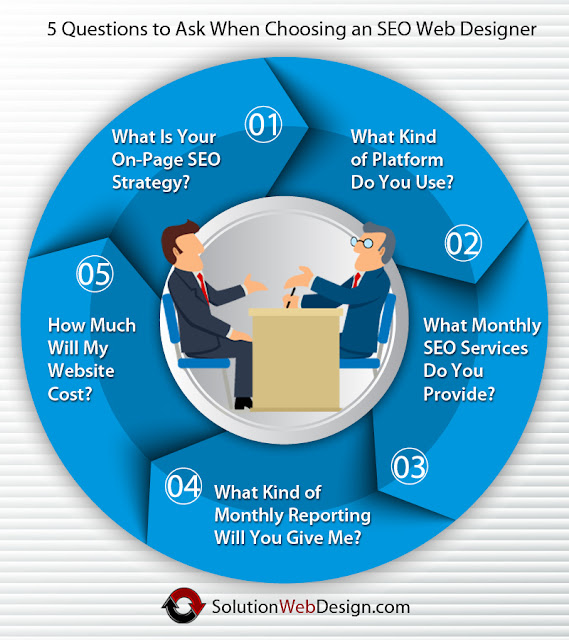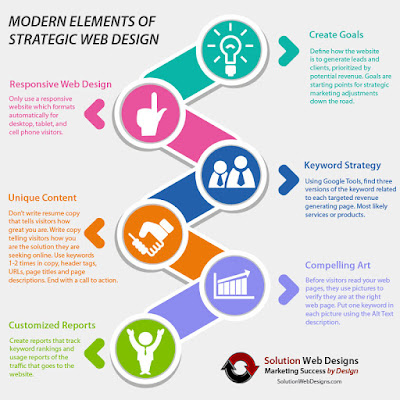Questions for Choosing an SEO Web Designer
5 Questions to Ask When Choosing an SEO Web Designer
There is a huge difference between a web designer and an SEO web designer. Choosing the right design team for your business is critical if you want to generate qualified leads for your business.
A web designer will make a pretty website. If you are a model who is building a portfolio website, you may not need SEO. Your name will be the only keyword required to find you and the search engines are smart enough to figure that out with proper SEO installed on the website. However, this is not a sound strategy for a business website that should generate customers and have a financial return on your investment.
An SEO web designer will make a pretty website strategically designed to generate business based on search engine keyword searches from your potential customers. SEO, or search engine optimization, refers to building a website that meets the criteria for showing up in Internet searches, and especially Google because they are the most popular search engine used by the public.
A good SEO Web Designer is invaluable. In fact, studies show that properly done SEO alone, can increase your business by 25% or more per month and on a consistent basis over old or unoptimized websites. However, all web designers are not created equal. When choosing a web designer, ask the following five questions to verify their qualifications and ensure you are selecting the best designer for your needs and budget.
1. What Is Your On-Page SEO Strategy?
Your first question could be: Do you do SEO? You can expect the answer to be "yes" from even the most unqualified designer. Your next question should be: How you optimize a web page for SEO? A qualified SEO designer will mention these fundamental points to building a proper SEO website:
- Keyword Research - To find the best keywords people are using now to find the products and services you offer. If you are a local business, the keyword phrases should include the most popular searches as found in the Google Keyword Planner.
- Proper Page Titles - Using the most important keyword phrase for the page.
- Proper Page Description - A compelling description of what the page is about, using the primary, and secondary keyword phrases for the web page. However, you do not want to stuff keywords just to use them. The description should not exceed 149 characters including spaces, and it should have a call to action to make searchers want to click to your page.
- 800 to 1,000 Words of Original Copy - If you copy is not 100% original, your web page will not rank. There are tools online, such as Copyscape, you can use to determine if your content already exists on the Internet. Plagiarized content generates ranking penalties.
- Proper Header Tags - Header tags start with H1, H2, H3, etc. H1 is the most important and would likely be the title of your web page. The H1 tag should have the same keyword phrase as your page title and be found in your page description. Header tags can go all the way up to H8, but if you had two good H1 nd H2 tags, you would be well ahead of most of the other websites on the Internet.
- Relevant Pictures with Alt Tags - Pictures help tell the story of your business without requiring the visitor to read. Photography is critical as most visitors will scan a web page and within four to five seconds, decide if they are on the right website. Posting a picture the visitor would expect to see help keep your visitors on the web page longer. Your designer should only be using licensed art, or original photos supplied by you. Using unlicensed art opens your business to the possibility of copyright laws that come with fees as high as $1,500 per picture or more. Think of an alt tag as a short description of the picture a blind person would understand what the picture is about. If you have two H tags, you will want to have two pictures. Picture one should have an alt tag for the keyword phrase you are trying to rank for in H1. Picture two should have an alt tag from the H2 keyword phrase and so on.
- Proper SEO Copywriting - Your targeted keyword phrases should not be on the page more than a few times, and they should be spread out throughout the page. Never twice in the same sentence or paragraph. The copy should read well for the visitor and not sound like a bunch of keywords stuffed into a web page.
2. What Kind of Platform Do You Use?
The only correct answer here is a responsive website design, which means your site is automatically formatted for desktop, tablet, and cell phone visitors. Try to avoid any custom web development projects. Not only are they costly, but you also lock yourself into the company and their rate of fees for the rest of your business relationship.
Most non-SEO web designers love to use WordPress because of its simplicity. Strategic marketers tend to stay away from using it. WordPress comes with "plugins" that can make a website responsive and do automatic SEO implementation, which is far from accurate or useful. WordPress sites are extremely vulnerable to hackers.
Look for a platform that has a WYSIWYG (What you see is what you get) interface. You never know, someday your business relationship could end, and you may find yourself stuck having to make web updates yourself. Also, a platform with phone tech support (most support is all email these days) is always a good idea. Duda would be a good example to learn more.
3. What Services Do You Provide After You Finish My Website?
If you get a blank stare or a long pause to this question, this candidate is probably not qualified to maintain an ongoing SEO service. When your website is finished it is not the end of the job; it is the beginning of the job! A properly optimized website is a great (and required) beginning to marketing your business online but it does not end there.
Have your designer install these free services with YOUR gmail or live account:
- Google Webmaster - To submit sitemaps, be alerted of any crawl or server issues, and more.
- Bing Webmaster - Same service but for the Bing search engine.
- Google Analytics - Track what happens to the traffic that comes to your website.
- Google My Business - Provides Google with information about your business of interest to new customers.
More is NOT better! Think of this as work you would do yourself, in your own voice, if you have the time. High-quality content with keyword phrases linking back to different pages on your website is a long-term plan for success. Your monthly SEO program should be consistent to yield the best results.
4. What Kind of Monthly Reporting Will You Give Me?
When you visit the doctor, he or she will maintain a chart of your medical history. The same idea applies to your online marketing program.
An SEO marketer should have access to a program that tracks all your H1 and H2 (and so on) keywords and keyword phrases. Knowing where your keywords rank on search engines tells you what pages you have to focus on with your monthly backlinking. Naturally, the higher you rank, the more traffic you will have coming to your website.
But you will also want to know what is happening with the traffic that is coming to your site. Key marketing metrics include number of visitors, bounces (meaning visitors look at one page and leave) and bounce rate, average time on a page, average time on the site, where the traffic is coming from, unique visitors, and what pages seem to have the most interest.
These are most basic examples of what online marketers track, but the important understanding is that adjustments and improvements cannot be made if you do not know how your new website is performing.
5. How Much Will My Website Cost?
This one situation where the lowest cost rarely equals the best service. Just like in your business, you can quickly point out why your lowest cost competitor does not provide a good value. That is because you have a lot of product knowledge and experience when it comes to the details of your business.
A properly built SEO website requires a lot of man-hours from qualified and experienced professionals, who are not free or cheap, and shouldn't be. Just like you would expect your customers to hire experts in your field, you should hold the same high regard for the person, team, or company you trust your website too. Your team could consist of SEO Specialists, SEO Copywriters, Designers, and most often overlooked, experienced Managers who oversee and make final decisions on strategy and design choices.
Spending money on advertising is different from spending money on marketing. The best marketers put a tremendous amount of heart and soul into generating results because return on investment (ROI) is the nature of their industry. If during your interview, you do not get the feeling of this passion and commitment to your long-term success, you may not be talking to the person that provides the best solution for your business.
That being said, the cost of a proper website depends on the size and the number of pages it will have. You should have the traditional pages for home, about, services, testimonials and a contact page with your location is customers come to you. But chances are very good none of those pages will generate customers except for your home page, and that would be based on how many people search your name or brand.
It is the services page most businesses overlook. I will use the word services here, but if you are a doctor, it is a list of what you treat, and if you are a store, it is a list of what you sell. Say you list fifty different services you provide on your services page. Each of those services has to have it is own properly optimized web page if you want to generate leads.
But don't panic!
You do not have to add all fifty pages during the initial build. I recommend to my clients that we chose which services to start with by balancing the services with the most keyword searches with the services that generate the most revenue. You can add more pages once a month, or once a quarter, or on any regular schedule, you like. Search engines love new pages! This strategy allows you to post revenue-generating web pages with the keyword phrases your customers are using right away and supports long-term growth to where the existing pages generate revenue for the new pages.
Some firms charge by the hour while some charge by the project. I prefer offering clients a flat rate per page and choose to manage the hours in-house. There could be additional fees for licensed art, web hosting, creating or updating social networks, email addresses, and photography and video services.
About the Author
Craig Corbel is the Vice President of Marketing for Solution Web Designs, a leading web design and online marketing agency located in Long Island NY. Learn more by visiting their website at SolutionWebDesigns.com



Comments
Post a Comment